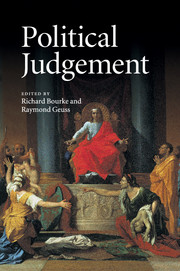Book contents
- Frontmatter
- Contents
- List of contributors
- Acknowledgements
- Introduction
- Part I The character of political judgement
- Part II Trust, judgement and consent
- Part III Rationality and judgement
- Part IV Democracy and modern political judgement
- 10 Democracy, equality and redistribution
- 11 Democracy and terrorism
- Bibliography of the works of John Dunn
- Index
11 - Democracy and terrorism
from Part IV - Democracy and modern political judgement
Published online by Cambridge University Press: 26 December 2009
- Frontmatter
- Contents
- List of contributors
- Acknowledgements
- Introduction
- Part I The character of political judgement
- Part II Trust, judgement and consent
- Part III Rationality and judgement
- Part IV Democracy and modern political judgement
- 10 Democracy, equality and redistribution
- 11 Democracy and terrorism
- Bibliography of the works of John Dunn
- Index
Summary
John Dunn's principal account of political judgement, The Cunning of Unreason, ends with an eloquent plea that we should feel more sympathy than modern intellectuals have been wont to do with the great structures within which we now lead our lives – that is, with a form of capitalism in our economic life, and with its associate, what Dunn calls the ‘modern democratic republic’, in our political life. These are the creations of political judgement, in his sense of the term: that is, they have come into being not through any systematic or ‘scientific’ theory of human goals, but through a much more complex and endlessly contestable process in which political agents are more important than political theorists, and in which the choices made in constrained and often tragic circumstances by real people in the end create the conditions in which we can live reasonably well and reasonably safely. As Dunn said in the last paragraph of the book,
We shall just have to see if this state form can muster the practical wisdom to rescue the world as a viable habitat for such vast numbers of humans in the centuries to come. We shall just have to see if it can continue to protect itself, co-operatively where possible but also in the end coercively when necessary, against the enemies which History will continue to send it. We owe it no veneration and we cannot reasonably expect to enjoy its ministrations over time. But we do owe it loyalty, and perhaps also some of our limited stock of patience. Human beings have done many more fetching and elegant things than invent and routinize the modern democratic republic.
- Type
- Chapter
- Information
- Political JudgementEssays for John Dunn, pp. 313 - 332Publisher: Cambridge University PressPrint publication year: 2009
- 2
- Cited by



